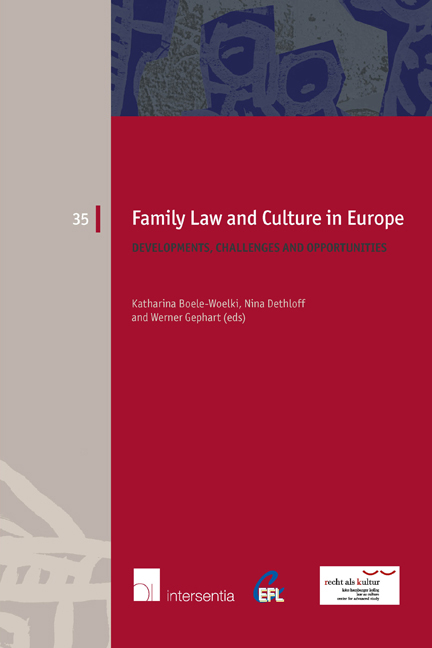Book contents
- Frontmatter
- Preface
- Contents
- List of Authors
- PART ONE THE CEFL PRINCIPLES ON PROPERTY RELATIONS BETWEEN SPOUSES
- General Rights and Duties in the CEFL Principles on Property Relations between Spouses
- Marital Property Agreements
- The Participation in Acquisitions Regime
- The Community of Acquisitions Regime
- PART TWO BREAKUP OF (NON-)FORMALISED RELATIONSHIPS
- PART THREE NEW CONCEPTS OF PARENTAGE
- PART FOUR INTERNATIONAL FAMILY RELATIONSHIPS
- PART FIVE TRANSNATIONAL FAMILIES: ACROSS NATIONS AND CULTURES
- EUROPEAN FAMILY LAW SERIES
The Community of Acquisitions Regime
from PART ONE - THE CEFL PRINCIPLES ON PROPERTY RELATIONS BETWEEN SPOUSES
Published online by Cambridge University Press: 22 November 2017
- Frontmatter
- Preface
- Contents
- List of Authors
- PART ONE THE CEFL PRINCIPLES ON PROPERTY RELATIONS BETWEEN SPOUSES
- General Rights and Duties in the CEFL Principles on Property Relations between Spouses
- Marital Property Agreements
- The Participation in Acquisitions Regime
- The Community of Acquisitions Regime
- PART TWO BREAKUP OF (NON-)FORMALISED RELATIONSHIPS
- PART THREE NEW CONCEPTS OF PARENTAGE
- PART FOUR INTERNATIONAL FAMILY RELATIONSHIPS
- PART FIVE TRANSNATIONAL FAMILIES: ACROSS NATIONS AND CULTURES
- EUROPEAN FAMILY LAW SERIES
Summary
INTRODUCTION
The CEFL eventually decided not to establish only one single matrimonial property regime but drafted two such regimes and refrained from giving one of them the function of a default regime and the other the status of an optional regime. Therefore, both the participation in acquisitions regime and the community of acquisitions regime are presented in the Principles of European Family Law Regarding Property Relations between Spouses as equal default regimes. The second regime, called community of acquisitions, corresponds with the French terminology communauté d'2cquets and the German Errungenschaftsgemeinschaft . The CEFL held that the label ‘community of acquisitions’ is preferable to the terminology ‘community of property’ because it clearly expresses the main feature of the regime as a restricted community.
Community of acquests or acquisitions is a matrimonial regime that several jurisdictions have opted for as a default regime. This is for example the case for Belgium (communauté des acquets, Gemeenschap van aanwinsten), Bulgaria, Croatia, the Czech Republic, France (communauté réduite aux acquets), Hungary, Italy (Comunione dei beni), Lithuania, Malta (community of acquests), Poland, Portugal (regime da comunhao de adquiridos), Russia, Slovakia, Slovenia, and Spain (sociedad de ganaciales). It appears that in mostly the Romanic European jurisdictions and the Central and Eastern European legal systems the community of acquisitions constitutes the default matrimonial regime.
Why did the CEFL decide to draft a set of Principles regarding the community of acquisitions regime?
First, because the comparative research-based drafting of the Principles revealed that the elements of all national systems surveyed cannot be merged into one single matrimonial property regime. There are two main systems with more or less important nuances and subcategories: a community system, on the one hand, and a participation system, on the other, while ‘their basic starting points are diametrically opposed’. A community of property regime between the spouses automatically takes effect at the moment of concluding the marriage, which is not the case in a participation system that treats the property of each spouse as the owner's separate property and only upon the dissolution of the marriage does it allow each spouse to partake in the assets of the other through a deferred community or a statutory compensation clause.
- Type
- Chapter
- Information
- Family Law and Culture in EuropeDevelopments, Challenges and Opportunities, pp. 37 - 62Publisher: IntersentiaPrint publication year: 2014



